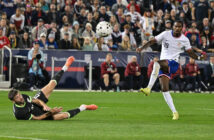When UEFA initially announced the format of the “Nation’s league,” it was met with heavy scrutiny. Fast forward to the present, the concept has grown into becoming an integral part of the football calendar.
For many football fans in the past, the international break signals boredom and watching tedious games being played with no real purpose or competitive edge. Effectively, it grinds the domestic leagues to a halt, frustrating the life out of supporters.
Friendly matches are not much more than glorified training sessions, with what feels like a constant turnover of players coming on and off the pitch. It is not unusual for countries to make six,seven, eight changes during a ninety minute match, which often results to matches having no rhythm or intensity.
With attendances and interest dwindling for the international game, UEFA had no choice but to look into the football program. Splitting European countries into a division system based on rankings, has produced some outstanding match ups. Unlike friendlies where top teams used to play each other but were meaningless, they are now pitted against each other in a competitive, ruthless environment, replicating the feeling of major tournaments.
Just in the last couple of months, supporters have been treated to some memorable matches through the format, including the Spain versus England game or the Holland versus Germany match.
With a relegation fear and a chance to top a three-way table, international breaks now well and truly have a purpose. Ultimately, the competitive element of these fixtures has made the UEFA Nations League work.

After England’s 2-1 victory against Croatia on Sunday, Gareth Southgate claimed he “hadn’t seen an atmosphere like that at the new Wembley.” Even fixtures, where the elite stars are on show has instantly enthralled supporters and captivated a media interest.
Despite the undoubted growth of UEFA’s concept, it has not been above criticism. Managers including Jurgen Klopp, are still strongly against the Nations League, due to it increasing the amount of unnecessary physical strain on a footballer’s already hectic schedule. In fact, the Liverpool boss branded it “the most senseless competition in the world of football” viewing it as an unwanted addition to the season’s calendar.
However, Jurgen Klopp’s comments should not be surprising. It is obvious to see that managers have always been reluctant to send their players out on international duty. Now, with the intensity increasing and the matches becoming more physically demanding, it only reiterates their hesitancy.

From a football follower’s point of view, the opinions of bosses should be taken with a pinch of salt. The UEFA Nations League format is thriving and is only going to grow and become stronger. Epitomized in the rapturous atmosphere at Wembley on Sunday, the cynics and doubters are slowly becoming supporters.
It is clear to see international breaks are not just produced for financial gain. After lengthy difficulty, UEFA have now made them purposeful. Football is an entertainment game and the UEFA Nations League has only emphasised this.
![Prost International [PINT]](https://prostinternational.com/wp-content/uploads/2021/08/PINTtFontLogoRoboto1536x78.jpg)



